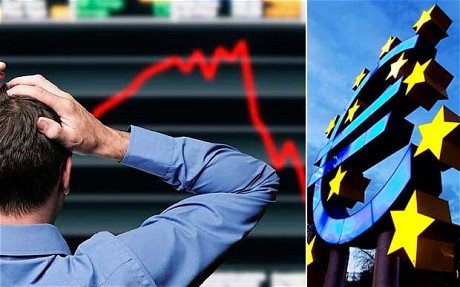European markets fall as concern continued over Greece and Spain
European stock markets had a shaky start on Friday as concern continued over Greece and Spain.
Spain’s main share index fell more than 2% before recovering, while shares in London fell by as much as 1%.
Confidence in European banks was undermined by ratings agency Moody’s, which cut the credit ratings of 16 Spanish banks late on Thursday.
It also cut the debt rating on Santander UK, a subsidiary of the Spanish banking giant.
However, shares in Santander reversed early losses to trade 3% higher, and Bankia shares jumped 9% following Thursday’s 14% slump.
Moody’s said there were several reasons behind the downgrade, including Spain’s slide back into recession, the financial challenges facing the Spanish government and bad loans in the property industry.
But Moody’s also recognized that banks had made progress in improving their financial situation, and noted the European Central Bank was providing support.
The proportion of loans that have gone bad at Spanish banks hit a record 8.37% in March.
That was according to figures from the Bank of Spain on Friday.
Despite rising bad debts and downgrades, and reports of large withdrawals from troubled banking group Bankia, the Spanish government does not expect a run on the country’s banks.
Spanish Treasury Minister, Inigo Fernadez de Mesa, said: “This is a scenario I do not contemplate. The Spanish banks have plenty of liquidity. They have been funded through the central government for the next two years, so there is no problem of liquidity at all in Spain.”
Nevertheless, some investors moved money into German bonds, which are seen as low-risk investments. That drove the yield on 10-year German bonds down to 1.399% on Friday, a record low.
Confidence has also been knocked by the political crisis in Greece, where politicians are preparing for the second election in six weeks.
It is possible that the election on 17 June will result in a government that would refuse to implement the austerity measures that Greece’s last remaining international creditors are insisting on.
Speculation is increasing that Greece may have to leave the eurozone
The challenges facing Greece and Spain will be under discussion this weekend at the Group of Eight (G8) summit at the US Presidential retreat Camp David in Maryland.
President Barack Obama will host leaders from Britain, France, Germany, Italy, Russia, Japan, Canada, and the European Union.
“The G8 meeting in Camp David today and tomorrow will be used to pressure Eurozone politicians to take immediate and decisive action to stop contagion ripping the region apart,” said the Dutch bank Rabobank in a research note on Friday.
“Whether the meeting will bring any signs that eurozone politicians may be willing to allow Greek to exit the system remains to be seen, but this type of rhetoric would likely have to be pre-empted by policies designed to limit contagion tightening its grip on Spain,” the note said.
In Asia, stock markets registered heavy losses. Tokyo’s Nikkei average fell 3%, the biggest one day fall since last August.
Asian markets were also hit by losses in New York, where the Dow Jones closed more than 1% lower.
Investors were discouraged by two weak reports on the US economy.
“There is no resolution to the [European] problem yet, and we also we had very disappointing US data, so overall, it’s negative and further denting market sentiment,” said Frances Cheung, a senior strategist, at Credit Agricole CIB in Hong Kong.
In Asia, banking shares were hurt after the chief executive of ANZ said volatile market conditions meant that Australian banks were not lending to each other.
The wholesale lending markets are an important source of funds for banks.
“Right now, markets are closed again, and this is what happens in this sort of situation,” said ANZ chief executive Mike Smith.

